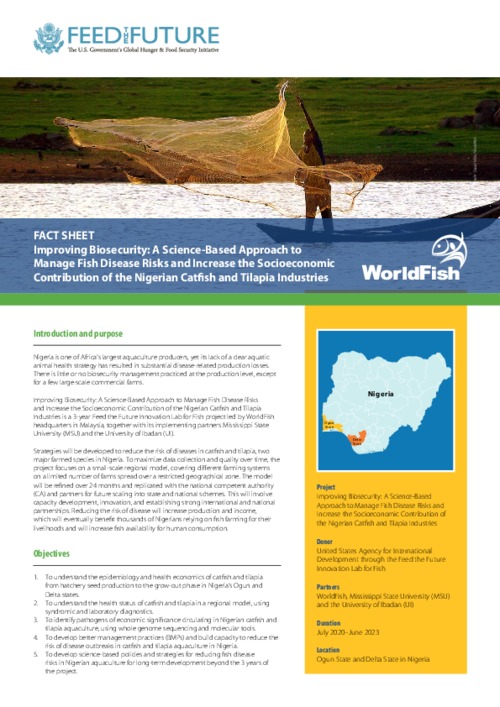Improving Biosecurity: A Science-Based Approach to Manage Fish Disease Risks and Increase the Socioeconomic Contribution of the Nigerian Catfish and Tilapia Industries

Nigeria is one of Africa’s largest aquaculture producers, yet its lack of a clear aquatic animal health strategy has resulted in substantial disease-related production losses. There is little or no biosecurity management practiced at the production level, except for a few large-scale commercial farms.
Improving Biosecurity: A Science-Based Approach to Manage Fish Disease Risks and Increase the Socioeconomic Contribution of the Nigerian Catfish and Tilapia Industries is a 3-year Feed the Future Innovation Lab for Fish project led by WorldFish headquarters in Malaysia, together with its implementing partners Mississippi State University (MSU) and the University of Ibadan (UI).
Strategies will be developed to reduce the risk of diseases in catfish and tilapia, two major farmed species in Nigeria. To maximize data collection and quality over time, the project focuses on a small-scale regional model, covering different farming systems on a limited number of farms spread over a restricted geographical zone. The model will be refined over 24 months and replicated with the national competent authority (CA) and partners for future scaling into state and national schemes. This will involve capacity development, innovation, and establishing strong international and national partnerships. Reducing the risk of disease will increase production and income, which will eventually benefit thousands of Nigerians relying on fish farming for their livelihoods and will increase fish availability for human consumption.
Permalink
Date Available
Type
Publisher
Countries
Copyright
CC-BY-NC-4.0
Research Themes
Topics
Language